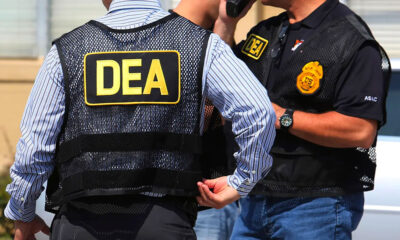
Edibles
Canadian Pot Drinks Restricted From Using Terms Like ‘Beer’ & ‘Wine’
“Barley soda” could be coming to Canada.
Although the concept of THC-infused beverages was predicted early on to be the exciting, modern approach to cannabis commerce that was going to take the industry to new heights of profitability, we’re probably not going to see this sector crushing it too hard later this year when it is rolled out in the northern nation.
Health Canada recently published rules that cannabis beverage-makers must adhere to in order to sling stoner sips in the coming months, and we’ve got to tell you there is certainly going to be a lack of sex appeal when these products hit the shelves in mid-December.
Canadian beverage makers are scrambling around trying to figure out how to brand their products to make them appealing to the consumer when the edibles markets open up later this year. But there are strict limitations that they must follow with respect to packaging that some fear may make these products a tough sell. For starters, none of the beverages can use familiar terminology like “beer” or “wine” to give the consumer some point of reference as to what the product might taste like.
Furthermore, all of the THC-infused drinks must be packaged according to the same guidelines as other pot products sold in Canada. This means they will be presented in opaque, child-proof containers with plain labels. Toss in the fact that these drinks will likely be given generic names like “Barley Soda,” and it is easy to see why there is some concern about whether there will be any fanfare.
“You have to essentially mirror the packaging of dried flower,” Hill Street Beverage Co.’s Terry Donnelly told Global News. “The beverage has to essentially look like toilet bowl cleanser.”
Unlike in the United States, where 11 states have legalized marijuana for recreational use, the Canadian government has taken a bizarre approach to its cannabis trade. While a consumer stepping inside a retail reefer outlet in the states can find brands like Willie’s Reserve and Marley Natural — all with their own unique packaging and graphics — the Canadian cannabis scene doesn’t allow any of that. “It’s almost like you’re buying something dirty in brown paper bags,” Neil Selfe, founder and chief executive officer of Infor Financial Group Inc, told Bloomberg. “It’s like liquor in the ’60s.”
Not only are the words “beer” and “wine” prohibited from being mentioned on Canadian cannabis beverages, but so are all of the alternatives. Beverage makers cannot plaster their products with labels like “Lager,” “Chardonnay,” or “Riesling.” Essentially, any descriptive term that has been used on a bottle of alcoholic anything (or tobacco for that matter) is off limits to the cannabis industry. Health Canada says this is happening because “combining cannabis with other substances can increase impairment or increase the risk of problematic use and associated harms.”
There were hopes that Health Canada would relax the regulations a bit for the edibles sector ahead of last Friday’s announcement, but the final rules show that the government still believes the plain jane approach is best for weed. Prime Minister Justin Trudeau has maintained throughout all of the discussions about Canada legalizing the leaf, that it has nothing to do with business. He only wants to stop criminal organizations from profiting and prevent minors from using it. Whether this model has been a success is another story. The Canadian black market still appears to be thriving, according to reports.
In some ways, it could be argued that the restrictive nature of the packaging rules gives cannabis companies an opportunity to establish something of their own. But since the concept of branding has been eliminated from the equation, cannabis firms are really left in the dark as to what is acceptable to print on labels and what isn’t. Some companies are actually toying with names like “Barley Soda,” or as Donnelly jokes “liquid fermented extract of cereal grains.” But ultimately, these firms are confused about the terminology they can use without being shut down by regulatory forces. “It literally leaves us guessing. We have created the names, we have invented new words to describe our beverages, and we hope that consumers will understand what they are,” Donnelly said.
It is the branding and marketing restriction that is and will continue to prevent Canada from becoming the global leader in cannabis, explains Selfe. “It’s a real consumer product in big U.S. states where it’s legal, and it isn’t that way yet in Canada despite the fact that we were first,” he said.
Some believe that the cannabis beverage market was a dead dog long before Canada released its rules on packaging. It was just last month that Aurora Cannabis CEO Terry Booth told investors that the company was starting to second-guess the market potential of cannabis drinks. Most of this squashed enthusiasm seems to be about the fact that it is going to be a long time before marijuana is sold in social situations the same as alcohol. But nevertheless, Booth assured the company’s money men and women that “the proven market is certainly not in beverage.”
But the THC-beverage scene could still take off. Some of the latest data from market research firm Deloitte still has this sector pegged as being part of a $1.6 billion stake in the Canadian cannabis market. “Cannabis-infused beverages” could be worth “$529 million,” said Jennifer Lee, a partner and Deloitte Canada’s Cannabis National Leader, and Consumer Advisory and Analytics Practice National Leader.
How it all shakes out in the end, we will just have to wait and see.
TELL US, have you ever tried a cannabis-infused drink?
























